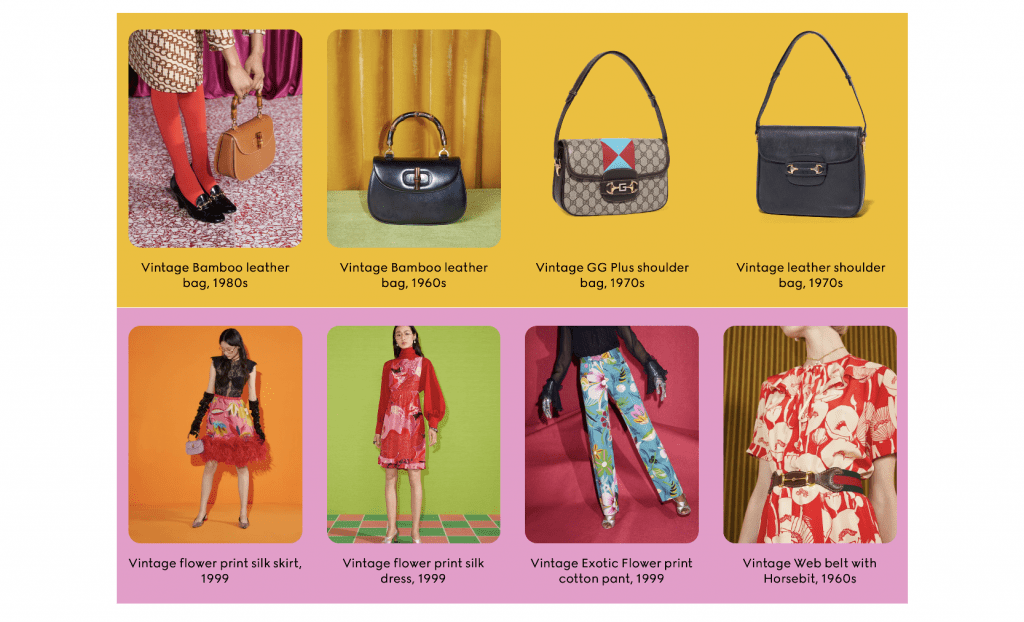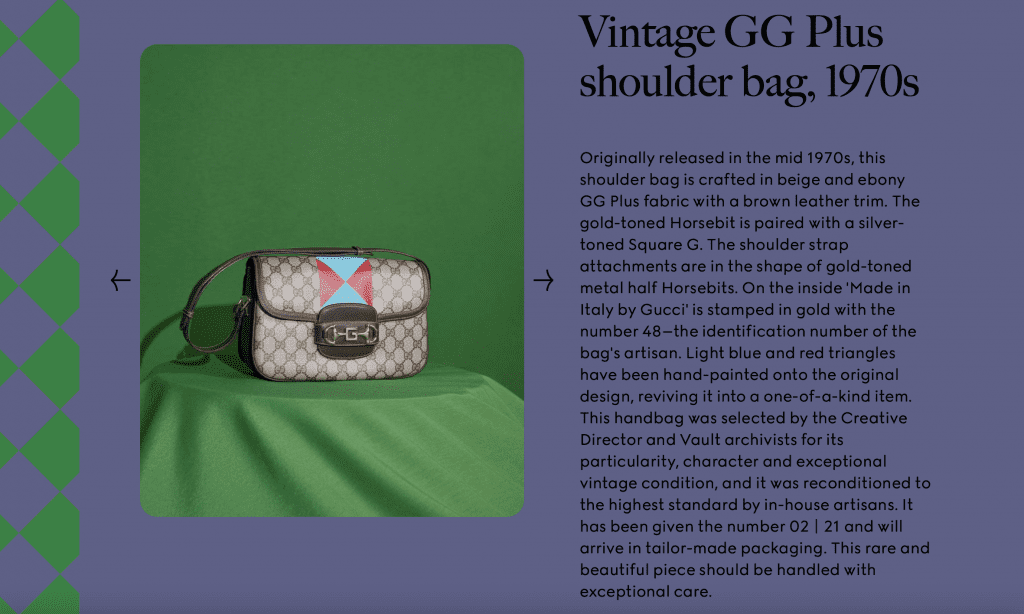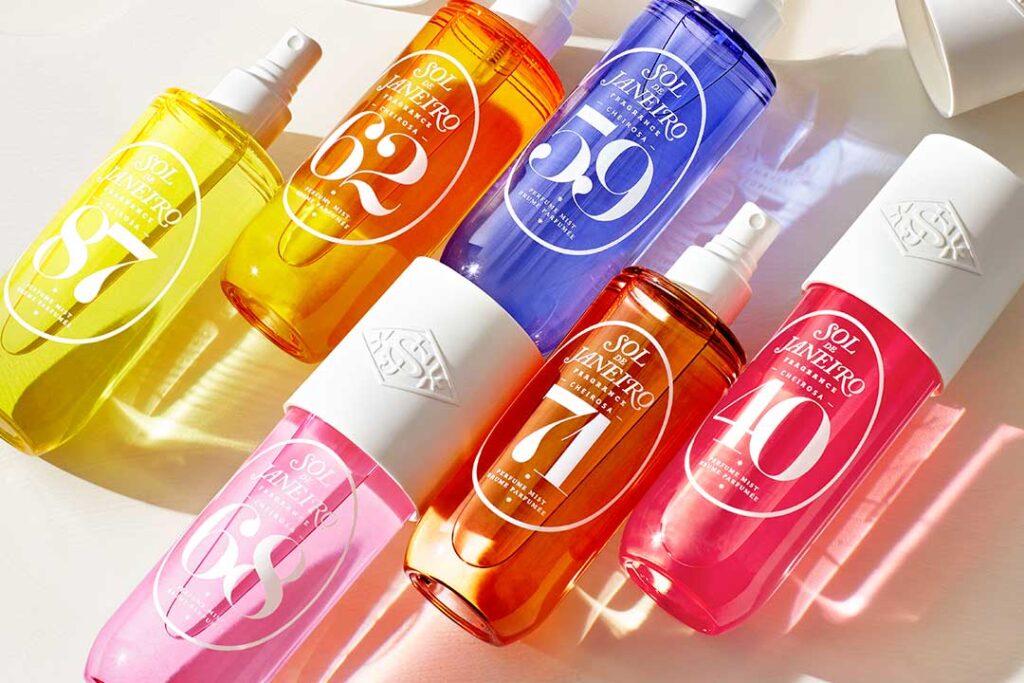Before Versace and Fendi co-opted Milan Fashion Week headlines and seemingly endless Instagram posts with their Fendace co-branded collection, Gucci rolled out an interesting venture. Called the Gucci Vault, the endeavor takes the form of a “new experimental online space,” that provides a showcase of – and e-commerce platform for – a number of Alessandro Michele-selected emerging designers, such as Collinda Strada, Ahluwalia, Yueqi Qi, and Charles de Vilmorin, among others; shares the history of various vintage Gucci looks; and “explores the world of autonomous sensory meridian response (ASMR) through a series of sensorial triggers designed to stimulate the brain and elicit physical sensations.”
At the same time, and in what is easily one of the most striking elements of the new project, the Gucci Vault platform also enables site visitors to get their hands on refurbished and/or customized vintage Gucci pieces. Writing for Vogue, Luke Leitch put forth a compelling description of the project, stating, “The logic behind Michele’s latest venture seems powerful. The idea of a luxury house offering vintage pre-owned items from its history is creatively mature, sustainably sensitive, and has commercial potential. Gucci is not only making moves to own its resale market, but by customizing the items before reselling them it is creating a new category of objects that are simultaneously vintage and new.”
The resale element of the project certainly provides a number of points that are worthy of discussion, including – but not limited to: (1) the attractiveness of resale for luxury players; (2) the issue of amassing stock for such endeavors; and (3) the budding rise of the customization market (and the benefits that brands can gain from participation in that segment).
Gucci Vault & The Allure of Resale
First things first: the Vault project is interesting, as it is the latest effort by Gucci in the resale market. Gucci, after all, was one of the relatively early movers when it comes to luxury brands testing out the waters of resale. It made headlines as the biggest name to partner with The RealReal (“TRR”) when the two parties announced a limited alliance in October 2020, which saw the resale giant partner with Gucci for a few months to launch an online shop featuring pre-owned Gucci items, sourced directly from Gucci, as well as from TRR’s own consignors.
As TFL wrote at the time, by offering up – and thus, taking charge of the sale of – their own pre-owned products, brands can gain an additional point of access to entry-level luxury spenders in much the same way as more accessible, lower-priced, and oftentimes licensed products do. At the same time, such in-house efforts or joint ventures give brands greater levels of control over where and the conditions in which their pre-owned products are sold, while also enabling them to extend the life of their valuable trademarks should they opt to put certain products on ice and then resume selling them years later.
The Vault appears as though it could be one more step in the direction of a larger resale effort by Gucci.

Still yet, adopting resale efforts of their own – complete with in-house refurbishing – may enable brands to avoid issues with unauthorized efforts by third parties and the subsequent resale of modified products without alerting consumers of such modifications. (As we have discussed at length, this has arisen as an issue in the lawsuit that Chanel filed against What Goes Round Comes Around (“WGACA”). In that still-ongoing suit, the French fashion brand has claimed that the reseller misled consumers by enlisting a third-party company to repair and/or refurbish Chanel products before offering them for (re)sale and allegedly failing to alert consumers about the altered state of the bags. WGACA has since argued that the “limited ‘sprucing up’ that [was carried out by Rago Brothers Shoe & Leather Repair] … never resulted in a Chanel product [being] ‘so repaired, reconditioned, or altered to have lost its identity as a genuine Chanel item.”)
Brands like Chanel appear to be doubling-down on in-house repair efforts, likely as a way to bolster their sustainability credentials and also potentially, to prevent issues similar to the ones raised in the WGACA case.
Amassing Inventory
One of the hurdles that has stuck out (to me) as a potential hindrance to the scale of third-party luxury resale endeavors is supply, as luxury resellers’ sales are dependent upon – and thus, potentially limited by – this very thing. As TRR, for instance, explicitly stated in its May 2019 S-1 filing with the Securities and Exchange Commission, “exclusive, authenticated pre-owned luxury supply drives demand,” with the reseller pointing to “fragmented supply” as an overarching issue inherent in “existing luxury resale models.”
Brands that are looking to take ownership in the resale market are not necessarily immune from this concern, although they likely have a key advantage in that they have access to unsold inventory, an issue that has long plagued fashion brands and led to a thriving global grey market. The melding together of pre-owned goods and close-out pieces would certainly help brands to maintain larger inventories to off-load in a “resale” capacity. (As TFL reported back in 2018, TRR appeared to be working with brands and/or retailers to off-load unsold apparel and accessories, seemingly putting it in the mix in the close-out space, as well as traditional consignment.)
Should brands aim to make bigger moves in the resale segment, chances are, it may serve as a way for them to sell off unsold goods, as well, especially given looming legal mandates that prohibit the destruction of products.
At the same time, brands that are looking to gain more exclusivity over the secondary market for their goods may attempt to engage in buy-backs to some extent. Fellow Kering-owned brand Alexander McQueen revealed that it had gone this route when it announced that it would partner with Vestiaire Collective as part of the French reseller’s “Brand Approved” program. In an announcement early this year, the British brand and the reseller asserted that “Alexander McQueen has invited longstanding customers to [sell] back pre-loved pieces they no longer wear and receive store credit [to use in Alexander McQueen stores] in return.” According to Vestiaire, “These pieces will be sold by us and listed under our new ‘Brand Approved’ label, ensuring the house’s unique craftsmanship lives on.” It would not be surprising if other brands engage in similar efforts, and potentially, go so far as to include language in their point-of-sale terms that give them the ability to buy back products from consumers. (More to come on this point soon.)
As for Gucci, creative director Alessandro Michele addressed the topic of supply in an interview this past week, telling Vogue that Gucci has “a vast network of sources for vintage Gucci, which it has been tapping to rebuild its archive.”
Market for Customizations

Finally, the presence of customized products in the Gucci Vault is especially noteworthy, as it gives Gucci yet another intriguing offering for consumers, particularly ones that may already have a collection of the readily-available, off-the-self Gucci bags, and are looking for more exclusive, and potentially one-of-a-kind pieces.
Customizations is a burgeoning market that is absolutely worth paying attention to, with companies like MSCHF, for instance, and other sneaker customizers turning otherwise run of the mill Nike sneakers into investment pieces, with eye-watering prices at resale. Meanwhile, players situated at the upper echelon of the luxury spectrum, such as Swiss watch workshop Artisans de Genève and London-based watch customizer Titan Black, and Privé Porter founder Michelle Berk, have been successfully trying their hands at respectively making already ultra-valuable watches and Hermès Birkin bags even more exclusive (and even more expensive) by way of customizations. Look no further than the arm of big-time Birkin and Kelly collector Cardi B at any point to see Berk’s handiwork of Swarovski crystal designs.
As such, not only is resale, itself, fertile ground for luxury brands, in-house efforts to provide valuable pools of clients with customized goods is an opportunity both in terms of revenue generation and customer retention.
Forward-thinking luxury brands, Gucci included, will likely start to inch into this space in a bigger way in an effort to continue to connect with deep-pocketed consumers, who are looking for increasingly hard-to-get goods to supplement their collections of their accessories of choice, and to stand out in a market where luxury goods are more readily available than ever thanks to the presence of resale giants, and the rise of e-commerce-driven accessibility more generally.














